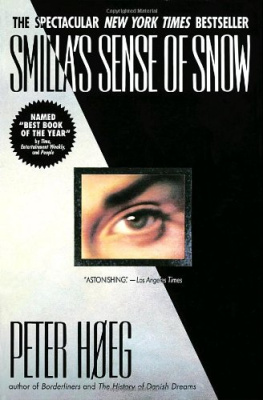The Quiet Girl
Peter Heg
Farrar, Straus and Giroux
19Union Square West, New York 10003
Copyright 2006 by Peter Heg
Translationcopyright 2007 by Nadia Christensen
Allrights reserved
Distributed in Canada byDouglas & McIntyre Ltd.
Printed in theUnited States of America
Originally publishedin 2006 by Rosinante, Denmark, as Den stille pige
Publishedin the United States by Farrar, Straus and Giroux
FirstAmerican edition, 2007
Library of CongressCataloging-in-Publication Data
Heg, Peter,1957-
[Stille pige. English]
Thequiet girl / by Peter Heg ; translated by Nadia Christensen.
-- 1 st American ed.
p. cm.
ISBN-13: 978-0-374-26369-0 (hardcover : alk. paper)
ISBN-10: 0-374-26369-8 (hardcover : alk paper)
I. Christensen, Nadia. II. Title.
PT8176.18.O335S7513 2007
839.8'1374--dc22
2007008187
Designed byJonathan D. Lippincott
www.fsgbooks.com
123456789 10
Acknowledgments
Thankyou to Jes Bertelsen, Erik Heg, Karen Heg, Nelly Jane,
Jakob Mailing Lambert, and Otto Moltke-Leth.
PART ONE
SheAlmighty had tuned each person in a musical key,and Kasper could hear it. Best in the brief, unguarded moments whenpeople were nearby but didn't yet know he was listening. So he waitedby the window, as he was doing now.
It was cold. The way it could be only in Denmark, andonly in April. When, in mad enthusiasm for the spring light, peopleturned off the central heating, brought their fur coats to thefurrier, dispensed with their long underwear, and went outside. Andonly when it was too late, discovered that the temperature was atfreezing, the relative humidity 90 percent, and the wind was from thenorth and went straight through clothing and skin, deep into thebody, where it wrapped itself around the heart and filled it withSiberian sadness. The rain was colder than snow, a heavy, fine rainthat fell like a gray silk curtain. From behind that curtain a longblack Volvo with tinted windows appeared. A man, a woman, and a childgot out of the car, and at first it lookedpromising.
The man was tall, broad-shouldered, used to gettinghis own way--and capable of having a powerful impact on those aroundhim if he didn't. The woman was blond as a glacier and looked like amillion bucks; she also looked smart enough to have earned itherself. The little girl had dignity and wore expensive clothes. Itwas like a tableau of a holy, wealthy family.
They reached the center of the courtyard, and Kaspergot his first sense of their musical key. It was D-minor, at itsworst. As in Toccata and Fugue in D-Minor. Great fateful pillars ofmusic. Then he recognized the little girl. At that precise moment thesilence occurred.
It was very brief, perhaps a second, perhaps not atall. But while it lasted, it obliterated reality. It took away thecourtyard, the rehearsal ring, Daffy's office, the window. The badweather, the April month. Denmark. The present time.
Then it was over. Vanished, as if it had neverexisted.
He clutched the door frame. There had to be a naturalexplanation. He'd suffered an attack of indisposition. A blackout. Atemporary blood clot. No one survives with impunity two nights in arow, from eleven to eight in the morning, at the card table. Or ithad been another tremor. The first big ones had been felt way outhere.
He cautiously looked behind him. Daffy sat at thedesk as if nothing had happened. Out in the courtyard the threefigures struggled forward against the wind. It hadn't been a tremor.It had been something else.
The true mark of talent is the ability to recognizewhen to give things up. He'd had twenty-five years of experience inrightly choosing to part with things. He need only say the word, andDaffy would deny him a home.
He opened the door and extended his hand.
" Avanti ,"he said. "I'm Kasper Krone. Welcome."
As the woman shook hishand, he met the little girl's eyes. With a slight motion, evidentonly to him and her, she shook her head.
* * *
He took them into the practice room; they stood therelooking around. Their sunglasses gave them a blank air, but theirtone was intense. They had expected more finesse. Something in thestyle of the main stage at the Royal Theater, where the Royal DanishBallet rehearses. Something like the reception rooms at AmalienborgPalace. With merbau and soft colors and gilded panels.
"Her name is KlaraMaria," said the woman."She's a nervous child. She gets very tense. You wererecommended to us by people at Bispebjerg Hospital. In the children'spsychiatric ward."
A lie causes a delicate jarring to the system, evenin a trained liar. So too in this woman. The little girl's eyesfocused on the floor.
"The fee is ten thousand kroner per session,"he said. That was to get things moving. When they protested, it wouldinitiate a dialogue. He would get a chance to listen to their systemsmore deeply.
They didn't protest. The man took out his wallet. Itopened like the bellows of an accordion. Kasper had seen wallets likethat among the horse dealers when he was still performing at fairs.This one could have contained a small horse, a Falabella. From itemerged ten crisp, newly minted one-thousand-kroner bills.
"I must ask you to pay for two sessions inadvance," he said. "My accountant insists on it."
Ten more bills saw the light of day.
He dug out his fountain pen and one of his oldletterpress cards.
"I had a cancellation today," he said, "soas it happens, I can just manage to squeeze her in. I'll start byexamining muscle tone and awareness of body rhythm. It will take lessthan twenty minutes."
"Not today," said the woman, "butsoon."
He wrote his telephone number on the card.
"I must be in the room," she said.
He shook his head.
"I'm sorry. Not when one is working withchildren on a deep level."
Something happened in the room--the temperatureplummeted, all oscillatory frequencies fell, everything congealed.
He closed his eyes. When he opened them again,fifteen seconds later, the bills were still lying there. He put themin his pocket, before it was too late.
The three visitors turned around. Walked out throughthe office. Daffy held the outer door for them. They crossed thecourtyard without looking back. Seated themselves in the Volvo. Thecar drove off, disappearing into the rain.
He leaned his forehead against the cold glass of thewindow. He wanted to put his fountain pen back in his pocket, intothe warmth of the money. The money was gone.
There was a sound from the desk. A riffling sound.Like when you shuffle brand-new cards for one of Piaget's games. Onthe desk in front of Daffy lay the small mahogany-colored stack ofnew bills.
"In your outer right-hand pocket," said thewatchman, "there are two hundred kroner. For a shave. And a hotmeal. There's also a message."
The message was a playingcard, the two of spades. On the back, written with his own fountainpen, were the words "Rigshospital. Staircase 52.03. Ask forVivian.--Daffy."
* * *
That night he slept in the stables.
There were about twenty animals left, horses and acamel, most of them old or worthless. All the others were still inwinter season with circuses in France and southern Germany.
He had his violin with him. He spread out his sheetand duvet in the stall with Roselil, half Berber, half Arabian. Shewas left behind because she didn't obey anyone except her rider. Andnot even him.
He played the Partita inA-Minor . A single lightbulb in the ceilingcast a soft golden glow on the listening creatures. He had read inMartin Buber that the most spiritual people are those who are closestto animals. Also in Eckehart. In his sermon "The Kingdom of GodIs at Hand." One should seek God among the animals. He thoughtabout the little girl.
When he was about nineteen, and had started to make aname for himself, he had discovered that there was money in hisability to access people's acoustic essence, especially children's.He began to cash in on it at once. After a couple of years he'd hadten private students per day, like Bach in Leipzig.
Next page













